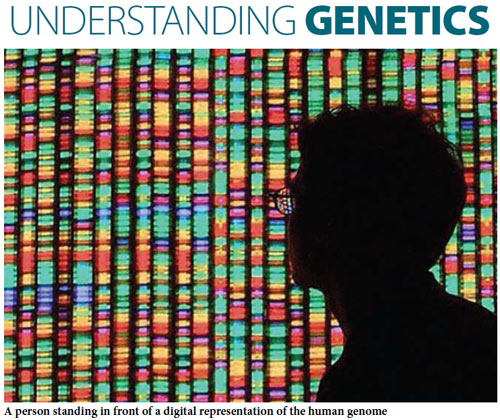
 Human Genetics is a hot topic as Trinidad and Tobago prepares to launch its first ever large-scale, human genetics research project. Unfortunately, much of the language used to transmit information about human genetics flies over our heads. In an effort to address this issue, Human Geneticist, Dr Allana Roach answers some questions. Human Genetics is a hot topic as Trinidad and Tobago prepares to launch its first ever large-scale, human genetics research project. Unfortunately, much of the language used to transmit information about human genetics flies over our heads. In an effort to address this issue, Human Geneticist, Dr Allana Roach answers some questions.
What is human genetics and what are genes?
Human genetics is the study of inheritance in human beings. I’m sure someone has told you “You’ve got your father’s nose or your grandmother’s eyes,” or you’ve heard someone say “Cancer runs in my family.” Human genetics endeavours to explain how these traits pass from generation to generation.
If you could peer into any one of your body’s 50 trillion cells, you’d find a complex and busy world, with a center called a nucleus, which contains 46 molecules called chromosomes. These 46 chromosomes are actually 23 pairs, with one chromosome in each pair from your mother and the other from your father. Together they contain the complete set of instructions for making you. A gene is a small section of chromosome that contains instructions that determine “something” about you.
So genes code aspects of who or what we are and how everything works on the inside. There are roughly around 23,000 genes in the human body and each cell of our body carries a copy of all of our genes.
If each cell carries the same 23,000 genes, why is my eye different to my elbow?
Genes are often called the blueprint for life, because they tell each of your cells what to do and when to do it. However, whilst each cell contains the same blueprint, or set of instructions, there is an intricate system of genetic switches that turn genes on and off making sure the right instructions are carried out at the right time in the right cell. Genetic switches determine everything from development of an eye to the development of your elbow.
If each person carries the same 23,000 genes, why are we different?
Each person is different because there are variations in our genes. The first level of variation results because we randomly obtain each of the two copies of our genes from our parents—one from each—who got their two copies from their parents and so on. Additionally, most our characteristics, are determined by more than one gene or as we say in “genetics speak” most “phenotypes” (characteristics) are “polygenic” (caused by many genes). A further level of complexity is added when we take the same gene and place it in different environments, genes are expressed differently in different environments.
Explain variations in genes and why they are so important.
Genes also change constantly over time. As we grow and develop, new cells are constantly being made and the genetic information is copied so that each new cell has its own set of instructions. The copying process is not 100% perfect so there are variations or “mutations.” If these mutations occur in sperm or egg cells then they may be passed from one generation to another. Some of these mutations can be beneficial, increasing genetic diversity aimed at keeping populations healthy. Many mutations are silent, meaning that they have no effect at all. And a few can lead to disease, a good example is sickle cell disease, a disorder caused by the mutation of a single gene; or breast cancer which usually results from a series of mutations within a single cell.
Are tests available to check for variations in my genes that may lead to disease?
Yes. Genetic tests are available to check for variations in several genes that have been linked to disease. Genetic testing can be performed on foetuses to check for the presence of an inherited genetic disease; it can be used to match organ donors and recipients; to establish paternity or maternity, and in forensics, for investigating evidence from crime scenes. Testing can also help diagnose adult-onset inherited diseases, such as Huntington’s disease. Most of the tests are however not widely available. They are generally still not cost effective enough to include in the routine diagnosis of most diseases.
What is the goal of health-related genetics research?
The goal of health-related genetics research is to identify changes in our genes which will aid in our understanding of human health, characterising of disease and the development of new technologies aimed at offering new forms of treatment and prevention.
If the goal of health-related genetics research is so good, then why is it often shrouded in controversy?
How much time do we have? The controversy that surrounds human genetics research is complex, but I will try to summarize a few main points.
For some it’s a moral issue. Many believe that genes hold the key to our very existence and any manipulation or inquiry into genes is seen as an inquiry into, or even worse, as a manipulation of God’s work.
Another reason is the fact that the types of conclusions that can be drawn from the research are poorly understood. Some people mistakenly believe that translating the research is as easy as “show me your genes and I’ll show you who you are.”
Finally, a far greater challenge is the human condition. History has proven that any technology developed by human kind can be used to do just as much bad as good. The technology and information that can be gained from human genetics is no different.
Does this mean we should not pursue human genetics research?
Not at all. It just means that human genetics research must be governed by STRICT codes of ethics. Human genetics research, like all other forms of human subjects’ research, undergoes stringent scrutiny and approval processes before it is actually conducted. Nothing in life is foolproof, but internationally and nationally, right here in Trinidad and Tobago, there have been immense progress to ensure that this type of research is conducted and translated in an ethical manner.
Food for Thought
It is really important that people understand that your genes are not your fate. Genes are not a blueprint in the same way a blueprint in architecture determines a building. Who we are, what we are, how we behave, the individual, our overall phenotype is NOT determined SOLELY by our genes, but by a more significant factor: the interaction between our genes and the environment.
So even if your genetics show you are at an increased risk for developing diabetes, this does not mean you are "fated" to manifest diabetes. Instead it means that you are forewarned and that you SHOULD manage your lifestyle in such a way to PREVENT the manifestation of diabetes. |





